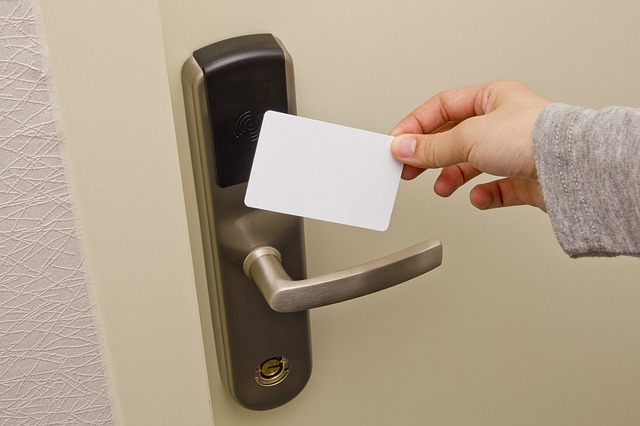We at Northeast Security Solutions find pride in our ability to provide customers with a variety of security products and services. As full security integrators, we describe ourselves as a “one stop shop” for our customers’ security needs. As such, we often see what areas of security customers focus on the most and which areas often fall short. Unfortunately, door locking hardware often fits the latter category. After all, many customers simply keep the door hardware installed by their door suppliers as long as they can. In order to cut costs, most suppliers will not provide top-of-the-line locks when installing doors. Additionally, customers do not always know what to look for when choosing locks either. Therefore, we often see low-to-medium quality locks installed in applications that call for the highest quality possible. In this post, we share the benefits of installing high-security door hardware.
We will begin with a look at how the industry grades locks. Knowing the variance in lock quality will help explain the differences in price and quality across the industry. From there, we will examine the long-term benefits of installing high-security door hardware. Then, we will share a couple additional benefits offered by this equipment. Specifically, we will look at key control and access control options. Now, let’s get started with a look at what we mean when we refer to the different “grades” of door security equipment.

It surprises many customers to learn that locks are “graded” to show customers their strength and durability.
Top Grade Security
All of us have heard the old adage that “you get what you pay for.” This sentiment runs especially true in the lock hardware industry. Many customers express surprise at how much the quality of lock hardware varies. In fact, lock hardware quality varies so much that the industry uses a three-point grading system designed by the American National Standards Institute (ANSI) and Builders Hardware Manufacturers Association (BHMA) to measure a lock’s quality.
Lock manufacturers often seek out ANSI/BHMA certification for their product lines. Tests are administered to gauge factors such as bolt strength, security, the ability to withstand impact and force, and quality of finish, among others. Allegion, one of the biggest global providers of security products, provides this helpful guide to door hardware testing. The lowest-quality hardware receives a “Grade 3” designation, with the best scoring in at Grade 1. As you can probably guess, Grade 2 falls right in the middle. Grade 2 locks represent a step up from Grade 3, without having quite the quality of a Grade 1 lock.
Most residential locks fall under the “Grade 3” designation, although we occasionsally see these locks installed in businesses as well. Grade 2 locks create better security than most, while we consider them “light” security for businesses. We always recommend installing Grade 1 locks to provide reliable commercial security. Grade 1 commercial locks, such as our preferred line by Medeco, create tremendous security against lock picking, drilling, and other blunt-force attacks. Businesses often sit empty for long periods of time, so we stress this tip quite a bit to commercial customers. Next, let’s look at how high-quality locks provide long-term security.
Performance for the Long Haul
We encourage customers to think about installing quality locks as a long-term investment. The additional security offered by Grade 1 equipment provides a huge benefit right away. However, the true value of installing high-security lock hardware comes with the passage of time. Many of our customers have gotten used to changing out locks and other related equipment every few years. Customers working within a tight budget install less-than-ideal equipment as a “bandaid” when a problem arises. Unfortunately, this leads to a cycle of spending money on the same types of equipment multiple times.
Grade 1 locks often have superior warranties compared with their Grade 2 counterparts. This provides peace of mind and protection for our customers. Additionally, high-quality equipment continues to work well and look good for several years. Everything from the interior mechanisms to the lock’s finish has to pass strict qualifications for that Grade 1 rating. Therefore, in time installing these locks still saves our customers quite a bit of money. Now, let’s check out a couple “extra” benefits your lock hardware can provide!
Additional Benefits
At this point, we’ve gone over a couple major benefits provided by high-security door hardware. The extra security and longevity offered by these products make them a great addition to any application. Additionally, adding this hardware offers a couple other benefits as well. Specifically, name-brand, Grade 1 lock hardware provides opportunities to create key control and to add electronic security down the line. In this section, we’ll detail what these types of security entail and how we provide them. Let’s start with a look at key-control security.

Key control systems allow you to limit and track the keys that work your doors.
Key Control
Even the sturdiest Grade 1 locks do nothing to stop someone who has the proper key. Of course, sometimes keys end up in the wrong hands. For this reason, we recommend using a key control system to help limit and track key copies. The best key control systems create unique key security in a couple different ways. First, key control customers create a list of those authorized to receive a copy of a key. When customers stop in for a copy of a secure key, we have to match their ID to the location’s list of authorized key copiers. If the individual is not on the list, we cannot create a key for them.
Additionally, top-of-the-line key control also involves the use of patented keyways. When locksmiths set up an account with a select few top lock companies, such as Medeco, they receive the ability to receive properietary locks that can only be opened with keys created by that locksmith. This adds superior key control, as Medeco customers cannot go to another locksmith to try to work around their location’s key copy list.
Finally, locksmiths that offer key control also track all of the keys they create for the system. This keeps customers from losing track of how many keys they’ve copied, as we always have that information on hand. Of course, you will not have the ability to create these systems with just any locks. Only a small small percentage of reputable lock manufacturers provide this service. We’ll now examine one more way that installing good door hardware can lead to extra security.
Interaction with Electronic Locking Hardware
Access control systems provide business owners the ability to allow or deny access to specific doors. Accomplishing this requires multiple stages of planning and work. For starters, installers must often utilize additional equipment to add electronic components to your door hardware. These newly-installed electronics then work with a reader or keypad to control who can get in a door, and when. If a user’s credentials allow access, the door unlocks for them. Of course, presenting an incorrect credential leads to a denial of access.
For the most part, access control customers have an easier time adding this security if they already have quality door hardware in place. For starters, access control equipment itself is high-security door hardware, and works best when installed with existing Grade 1 equipment. Additionally, we find it much easier to find access control equipment for high-end door hardware. For example, many doors have crash bars installed on them. In this case, we can install an electronic retraction kit that fits into the crash bar in order to make it an access control door.

Access control equipment is usually comprised of high-security door hardware.
If you have a commercial-grade, name-brand crash bar installed, we can usually find this equipment with no problem. However, manufacturers do not often create these retraction kits for lower-grade crash bars. Therefore, installing the right equipment now can “future-proof” your doors for electronic security down the line. For more information on these systems, check our our post, The How, Where, When, and Why of Access Control.
Finding High-Security Door Hardware for Your Application
We hope that this post has helped you see the benefits of installing high-quality lock equipment! Moreover, we encourage you to contact us with any questions you may have. Whether you have questions about lock hardware or security in general, we’re here to help. Additionally, we offer free site surveys to both new and existing customers alike. During our visit, we can address any security concerns you may have. Furthermore, we can make our own recommendations based on what we find during our visit. Together, we can design and install locks as part of a complete security plan to keep your property, as well as everyone in it, as safe and secure as possible!
All photos published under the Public Domain CC0 License.
